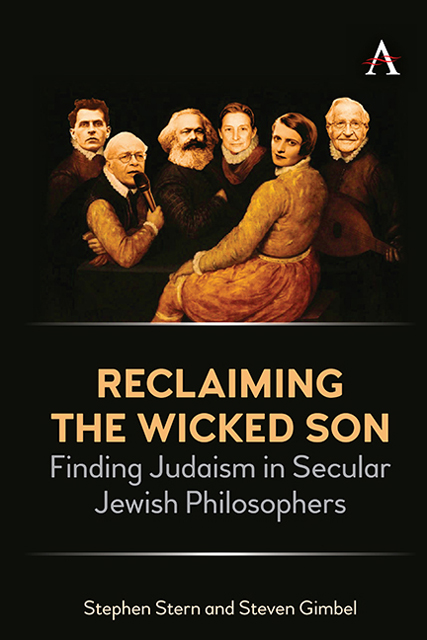Book contents
- Frontmatter
- Dedication
- Contents
- Introduction: Reclaiming the Wicked Son
- 1 Karl Marx and Materialistic Messianism
- 2 Ludwig Wittgenstein and Neo-Talmudic Thought
- 3 Ayn Rand and the Hassidic Courts
- 4 Peter Singer: The Amos of Anim
- 5 Judith Butler and Orthopraxy
- 6 Noam Chomsky, Kabbalist
- Conclusion: Re-Membering the Tribe
- Bibliography
- Index
2 - Ludwig Wittgenstein and Neo-Talmudic Thought
Published online by Cambridge University Press: 10 January 2023
- Frontmatter
- Dedication
- Contents
- Introduction: Reclaiming the Wicked Son
- 1 Karl Marx and Materialistic Messianism
- 2 Ludwig Wittgenstein and Neo-Talmudic Thought
- 3 Ayn Rand and the Hassidic Courts
- 4 Peter Singer: The Amos of Anim
- 5 Judith Butler and Orthopraxy
- 6 Noam Chomsky, Kabbalist
- Conclusion: Re-Membering the Tribe
- Bibliography
- Index
Summary
Nouns are persons, places or things. Verbs are words that describe actions. Hellenic-Christian thought focuses on the noun. It is based on the assertion that truth is a thing. Rabbinic Jewish thought focuses on the verb. It is based on the assertion that the seeking of truth is a process. It is the doing that is important. In the first half of the twentieth century, the high point of the Hellenic project was achieved by Bertrand Russell and Alfred North Whitehead in their masterwork Principia Mathematica. In this monumental three-volume tome, they not only sought to find an absolutely firm foundation for mathematical truth, but did so with the creation of a first-order predicate logical language that became the arbiter of absolute truth. Their student, Ludwig Wittgenstein, sought to undermine their work by attacking it at its root. Philosophy is not to be the worship of a thing; philosophy is a process, a process that bears a striking resemblance to that of rabbinic Judaism.
Hellenic-Christian Thought
Classical Greek thought was fascinated with process. One could see the central question of ancient Greek thought as the need to account for change. The movement of objects near the Earth, the movement of the heavenly bodies, the reproduction of animals, the growth of living things, the choice of actions by individuals, the determinations of law by the polis and all of the questions of the great Hellenic thinkers sought to explain change.
Yet, while processes formed the content of their interest, it was rarely to be found in the answers proposed. With the exception of a few figures like Empedocles, the approach that dominated this period was teleology. All things possessed a telos, an end, an aim and a goal. Change is always change toward something, for the sake of something, an actualizing of potential contained within the thing. Classical Greek thought sought to turn the how into a what.
This commitment to teleology caused there to be two general camps. On the one side, following Heraclitus, were those who saw change as eternal because the telos was an asymptote, to be approached, but never achieved. All things are driven by their aim, to reach their full potential, but as good as they get, they will never quite embody its perfection.
- Type
- Chapter
- Information
- Reclaiming the Wicked SonFinding Judaism in Secular Jewish Philosophers, pp. 29 - 44Publisher: Anthem PressPrint publication year: 2022

